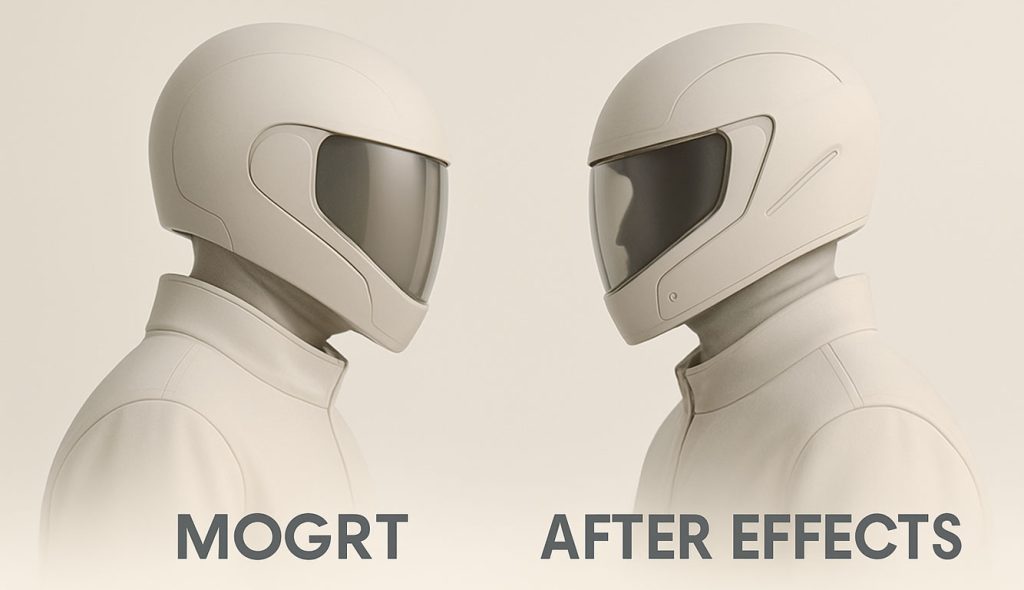
When creating motion graphics or editing videos, you’ll often see two popular file types: After Effects Templates and MOGRT files.
Although they may look similar, they are made for different workflows. Understanding the difference helps you choose the right option for online editing, faster content creation, and professional results—especially if you work with limited software or want quick customization.
In this guide, we break everything down clearly so you know exactly which format you need.
Motion Bank 21
What Are After Effects Templates?
After Effects templates are editable project files (.AEP) created in Adobe After Effects.
They include full compositions, layers, effects, text, transitions, animations, and more.
Best for:
- Designers who need deep customization
- Complex animations, logo reveals, intros, and advanced motion graphics
- Users with After Effects installed
Advantages
- Maximum creative control
- Every layer can be edited
- You can add or remove animations
- Perfect for advanced projects or client work
Disadvantages
- Requires Adobe After Effects
- Can be heavy and slow to render
- Not beginner-friendly
What Are MOGRT Files?
MOGRT stands for Motion Graphics Template.
These are created inside After Effects or Premiere Pro but exported as a single editable file (.MOGRT).
You import them into Adobe Premiere Pro — or upload to certain online editors that support MOGRT — and then easily edit text, colors, or images through a simple control panel.
Best for:
- Fast editing directly inside Premiere Pro
- Creators who don’t use After Effects
- Quick social media graphics, titles, subtitles, lower thirds, transitions, etc.
Advantages
- Super easy to use
- No After Effects needed (once exported)
- Faster rendering
- Cleaner workflow for editors
- Perfect for teams or clients
Disadvantages
- Limited customization
- You can only change what the template creator allows
- Not suitable for complex animation changes
Main Differences: AE Templates vs. MOGRT Files
| Feature | After Effects Templates | MOGRT Files |
|---|---|---|
| File Type | .AEP | .MOGRT |
| Software Needed | After Effects | Premiere Pro (or some online editors) |
| Customization Level | Advanced (full control) | Basic (limited to controls) |
| Ease of Use | Harder | Very easy |
| Render Time | Usually slower | Faster |
| Who Uses It | Motion designers, animators, studios | Video editors, content creators, marketers |
Which One Should You Use?
Choose After Effects Templates if you:
✔ Need full control over animation
✔ Want to make heavy motion graphics
✔ Work professionally in After Effects
✔ Need custom timing, styles, or layout changes
Choose MOGRT Files if you:
✔ Need fast turnaround
✔ Edit mainly in Premiere Pro
✔ Don’t want to open After Effects
✔ Need quick lower thirds, titles, and transitions
✔ Want simple drag-and-drop editing
Why MOGRT Files Are Becoming More Popular
In 2025, more creators are switching to MOGRTs because:
- Online video editing is growing
- Social media demands fast content
- Teams need reusable templates
- Premiere Pro users want one-click edits
- Many websites offer online editing without expensive software
They’re perfect for people who want professional motion graphics without using After Effects at all.
Can You Convert Between Them?
✔ AEP → MOGRT
Yes, you can export your After Effects template as a MOGRT file.
However, you must set up Essential Graphics controls first.
✖ MOGRT → AEP
No — you cannot open a MOGRT file as a full After Effects project.
The editable structure is locked to protect the original project.
Conclusion
The choice between After Effects Templates and MOGRT files depends on your workflow:
- If you want deep customization and advanced animation, choose After Effects Templates.
- If you want speed, simplicity, and quick edits, choose MOGRT Files.
Both formats are essential in modern video production—especially for online creators, editors, and marketers who need professional results fast.

